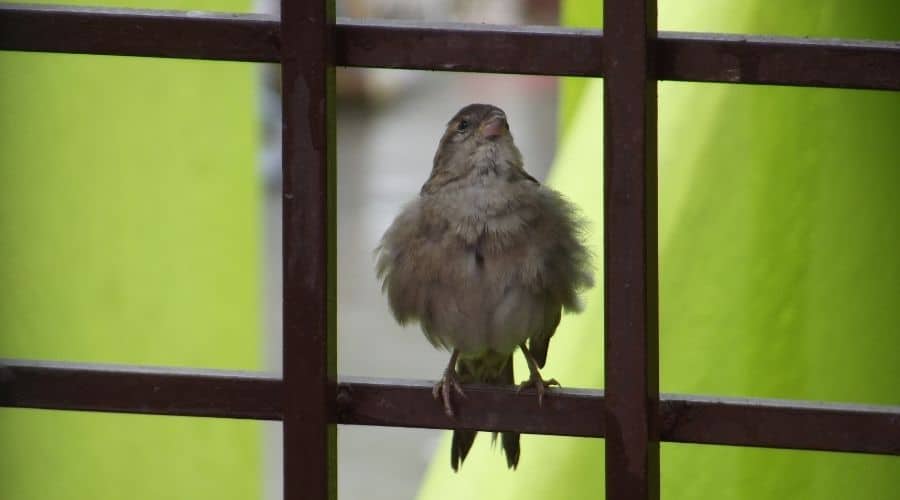Shaking is as natural to birds as perching or flying. Not only do birds shake for numerous healthy reasons, like shivering to stay warm or even while grooming, but they also sometimes shake when something is wrong.
A sick or stressed bird often quakes to indicate a problem. Why is my bird shaking?
Birds will shiver and shake after taking a bath in order to create body heat to stay warm. When an ordinary healthy bird shakes, it is usually showing contentment or grooming themself. However, your bird can shake due to fear, stress or health issues. Watch for any sluggish, defensive or unusual behavior caused by illness or injury.
Table of Contents
Why Is My Bird Shaking Its Head
Unless you taught your bird a trick that involves headshaking, then they are bobbing their head for one of three reasons. For example, your pet may be trying to get you to play or shaking water from their ears.
The reasons below are both learned and native to many bird species for shaking their head.
Firstly, domesticated birds use head bobbing and other movements to tell you they feel ignored. For some, it’s more of a dance, while others tap their beaks, but mostly they’ll repeat anything that has worked in the past to get you to drop everything and give them attention.
Pet birds want and need to be the center of attention. Getting noticed by you is high on their priority list. They love talking to you, sitting on you, getting their heads scratched, and otherwise interacting.
Like a cat’s meow, the head bob or shake is a behavior that birds developed to communicate with humans.
The second reason a bird may shake its head is water. Although birds don’t have large external ears, they do have openings for sound to pass inside, which means water can also get in.
Occasionally, a bird will shake their head because there’s water in its ears and the sensation is unpleasant for them, just as it is for humans.
This is probably the culprit if your pet is shaking its head after playing in a birdbath or water dish. Additionally, birds can get water in their ears when you give them showers or rain if they’re outside.
The shaking is regular, and it will stop as soon as the water is out from shaking or evaporation.
Finally, birds open their mouths and do a little head shake to crop adjust. This shaking can look alarmingly like the bird is gagging, choking, or about to vomit, but it’s actually normal behavior.
They are shuffling seeds around for more comfortable digestion.
According to the bird experts at Kaytee, “The crop stores food temporarily and starts the digestion process before it enters the stomach. It is a thin-walled pouch at the base of the esophagus where birds can store food before it is sent the rest of the way to the stomach. When the crop becomes empty, hunger signals are sent to the brain, telling the bird it is time to eat. The flexibility of the crop allows birds to eat more food than necessary in a single feeding. “
Why Is My Bird Shaking Its Wings
Birds use their wings to indicate their mood. Droopy wings are sad or tired, or drooping can warn you that your pet is feeling ill and needs to see the vet.
Meanwhile, a bird may flap and hold out its wings to look bigger when angry or scared. However, most wing shaking is a sign of contentment. Your bird is happy.
Why Is My Bird Shaking His Tail
Birds often shake their tails for the same reason they shake their wings. In fact, it’s all part of the same body movement.
Luckily, this is usually a sign that the bird is happy. However, if the bird is displaying its tail like a fan or dancing, it’s probably part of the mating ritual.
When no other birds are around, your bird may still do mating dances with tail shaking for humans or even toys.
Notably, tail fanning can also signal that they are feeling territorial or angry. It’s vital to pay close attention to your birds’ body language and moods over time to understand what they mean.
Why Is My Bird Shaking After A Bath
There are two sensible reasons why a bird shakes after a bath. Firstly, they can flutter to remove water off their feathers, like a dog shakes water off its fur.
Since they can’t use a towel, it’s a sensible way to shrug off some excess moisture.
The other reason birds often shake after a bath is from the cold. Just as humans catch a slight chill when the water evaporates, birds also feel cold. Shivering is a body’s way to heat up.
According to Brittanica, “Shivering is muscle activity that generates heat and warms the body… When an animal shivers in the cold, a large amount of heat is generated in the muscles.”
Why Is My Bird Shaking While Sleeping
A bird who shakes while sleeping should see the vet immediately to check for neurological issues and illness. However, it’s not always bad news.
Birds may twitch in their sleep while dreaming, or they can shiver as a sign of cold, anxiety, or other solvable problems.
Why Is My Baby Bird Shaking
Most of the time, baby birds shake from the cold. If you are hand-feeding a bird, ensure that you give it room temperature food, so you don’t accidentally drop its body temperature.
Additionally, bald hatchlings need somewhere warm to spend their time between meals.
Helpful Tips To Know About Why My Bird Is Shaking
There are so many reasons birds shake that it’s almost impossible to know why they’re doing it without more context. Is your pet’s whole-body quaking, or are they bobbing their head? Is it a wing or tail thing? Are they even awake?
Here are more helpful tips to know about why my bird is shaking.
- Birds will shake when they get broody. It helps to know the biological sex of your bird because that will tell you if eggs are a possibility in the future.
- Shaking can have many meanings, and most of them are good, or at least a healthy expression of how they feel, but not always. Sadly, a seizure can also look like shaking. According to Mickaboo, “Actual seizures can involve loss of control of a bird’s skeletal muscles resulting in waves of involuntary movement. They are caused by spontaneous, temporary disturbances of the brain’s electrical activity. Often the bird will appear normal between episodes.”
- If your bird is shaking from stress or anxiety, sometimes the best thing you can do is step back and let them calm down. You can try talking to them in a soothing tone as well.
Final Thoughts
Birds shake for lots of reasons. Sometimes it’s joy and excitement, or as a way of attention-seeking because you notice when they move around a lot.
A bird will shake when it feels broody, moody, or romantic. Unfortunately, some shaking can mean the bird is cold, anxious, ill, or even having a seizure, but these are less common.
Whatever the reason, a shaking bird is always saying something with its body, and you should pay close attention in case they need help.

